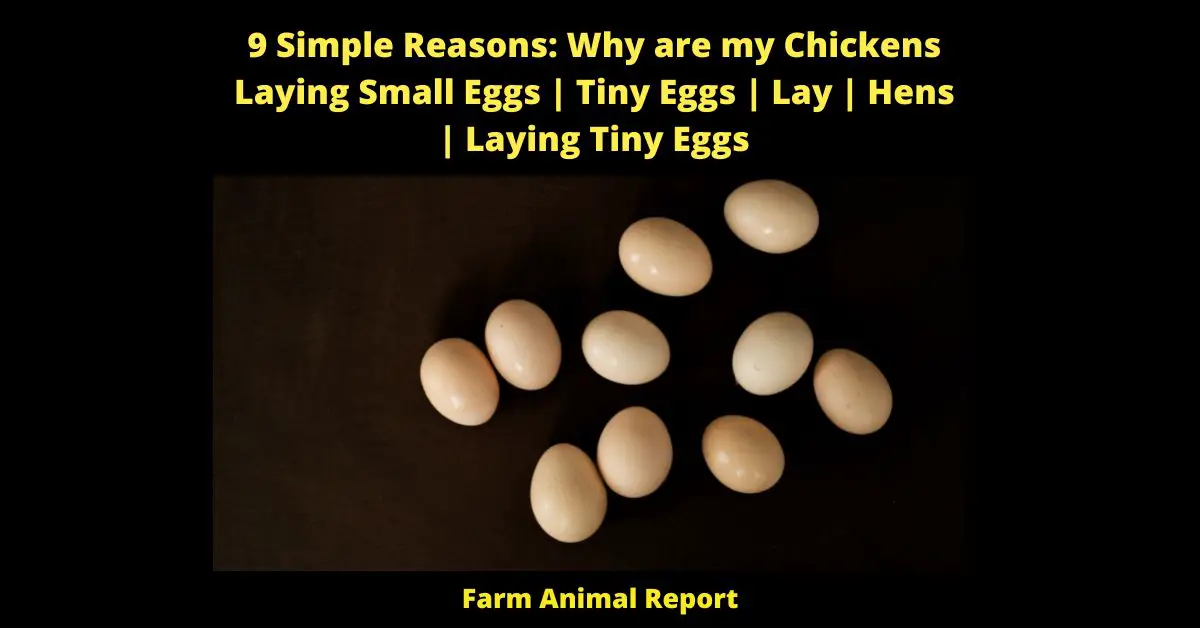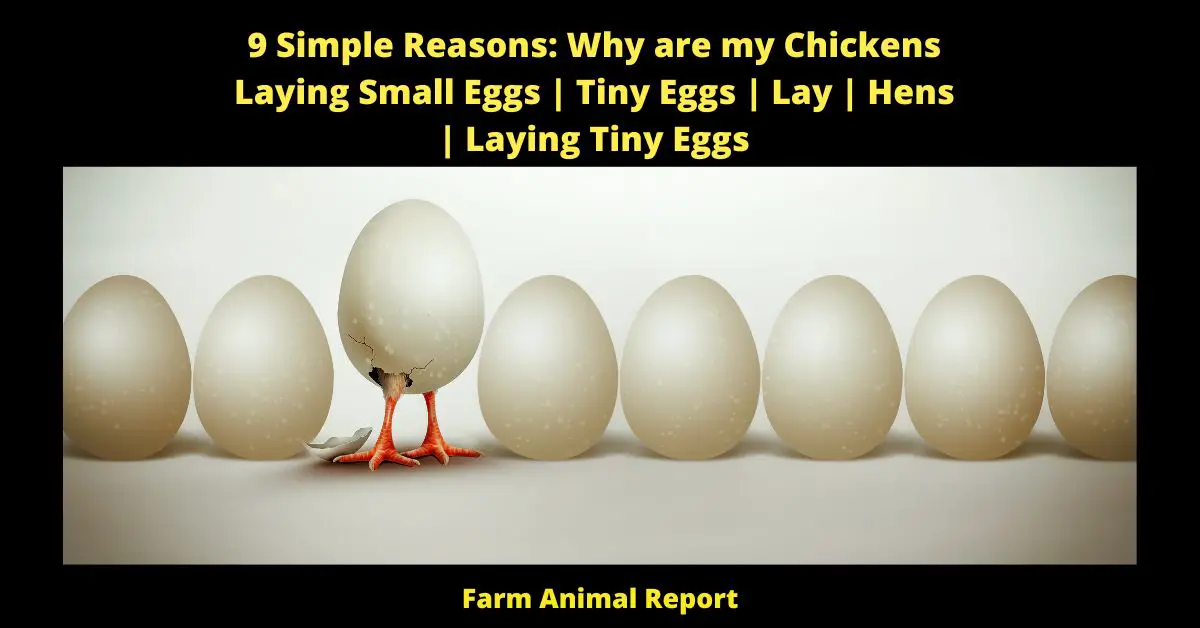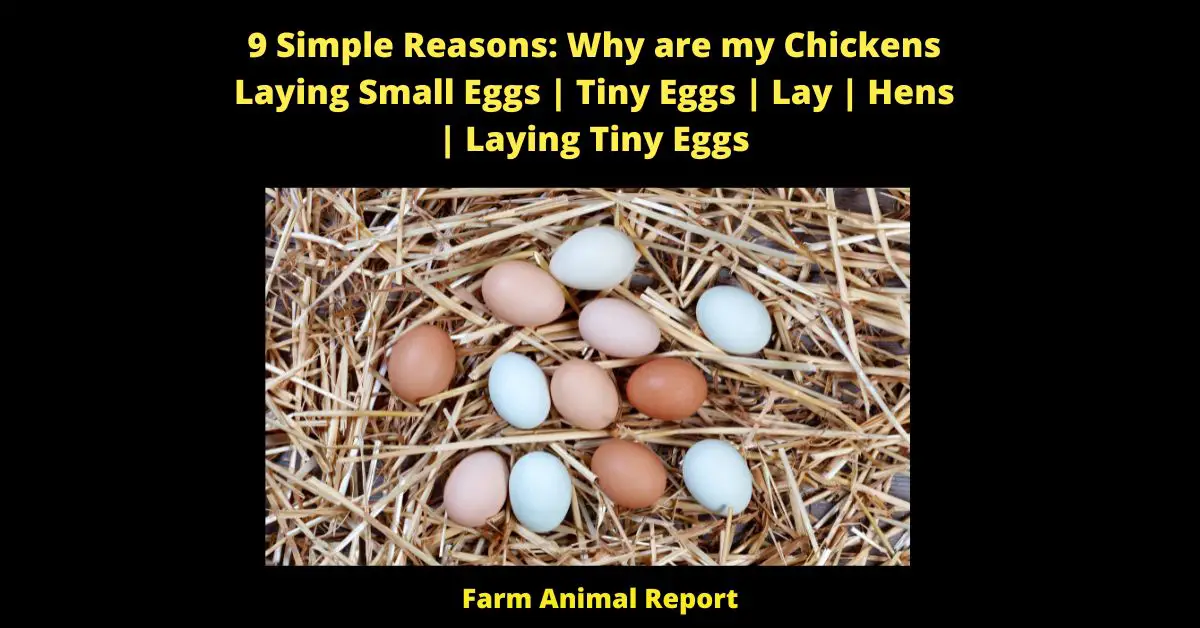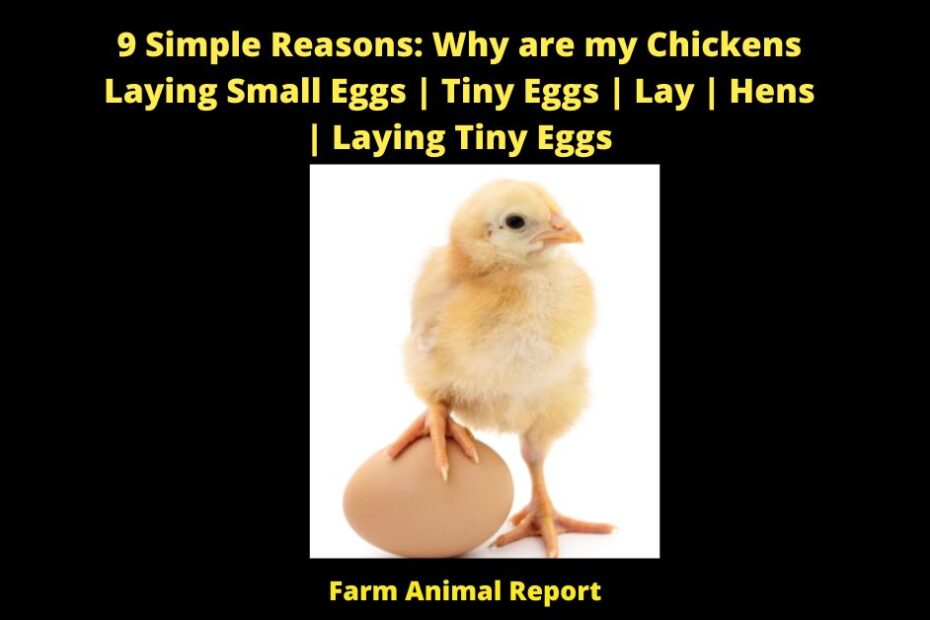If you have a backyard chicken coop, you may have noticed that your chickens are laying small eggs. This can be frustrating, especially if you were expecting large eggs from your chickens. So why are my chickens laying small eggs? There could be a number of reasons why this is happening, but we will discuss some of the most common causes in this blog post.
Why are my Chickens Laying Small Eggs?
1. Stress – Chickens that are laying small eggs may be malnourished or stressed.
2. Sick – Chickens that are laying small eggs may be experiencing health problems.
3. Dehydrated – Chickens that are laying small eggs may be dehydrated.
4. Infection – Chickens that are laying small eggs may be suffering from an infection.
5. Vitamin Deficiency – Chickens that are laying small eggs may have a vitamin deficiency.
6. Parasites – Chickens that are laying small eggs may be affected by parasites.
7. Hormonal Imbalance – Chickens that are laying small eggs may have a hormonal imbalance.
8. Senior Hens – Chickens that are laying small eggs may be nearing the end of their egg-laying lifespan.
Check Out Amazon for Educational Resources for Breeding Chickens
9. Young Hens – Chickens that are laying small eggs may be young chickens that have not yet reached their full egg-laying potential

Lay Smaller Eggs at Beginning of Laying Cycle
A chicken’s laying cycle has several distinct phases, each of which can last for several weeks. During the first phase, called the induction phase, the chicken’s body prepares for egg production by increasing its levels of estrogen. Why are my Chickens Laying Small Eggs?
This increase in hormone levels causes the chicken’s ovaries to mature and begin releasing eggs. However, these early eggs are usually smaller than the eggs that are laid later in the cycle.
The reason for this is that the chicken’s body is still adjusting to the new hormone levels, and it takes a little time for the egg-laying process to reach full capacity. Once the chicken has passed through the induction phase and entered the peak production phase, her eggs will be larger and more regular in size.
What are Standard Egg Sizes?
- Pewee – 1.25 Oz Each
- Small – 1.50 Oz Each
- Medium – 1.75 Oz Each
- Large – 2.00 Oz Each
- Extra Large – 2.25 Oz Each
- Jumbo – 2.50 Oz Each
Laying Small Eggs Oddly Shaped Eggs
Chickens usually lay small, round eggs. However, sometimes they may lay unusually shaped eggs that are small and have an odd shape.
There are several reasons why this may happen. First, the chicken may be young and still learning how to lay eggs. Second, the chicken may be sick or have a vitamin deficiency. Third, the chicken may be stressed due to hot weather or a change in its environment. fourth, the chicken’s diet may be lacking in certain nutrients.
Finally, the chicken may have an infection or other medical condition that is affecting its ability to lay eggs. If you notice your chicken laying small, oddly shaped eggs, there are several possible explanations. However, it is always best to consult with a veterinarian to rule out any underlying health problems.
What are Fairy Eggs?
Fairy eggs are an anomaly that can happen in any chicken flock. No one is sure what causes them, but they are perfectly safe to eat. Fairy eggs are small, usually about half the size of a normal chicken egg.
They have a thin shell and sometimes have no yolk at all. Sometimes, fairy eggs will have a yolk that is much smaller than normal. Chickens typically lay fairy eggs when they are first starting to lay eggs, or when they are experiencing stress. If you find a fairy egg in your coop, don’t be alarmed! Just consider it a special treat from your hens.
What are Pullet Eggs?
Pullet eggs are small eggs laid by chickens that are still young. They typically have no yolk, or a very small yolk, and are much smaller than normal chicken eggs. Chickens usually lay pullet eggs during their first few months of lay, before they reach full size.
The main reason for this is that pullet eggs are an easy way for chickens to get rid of excess calcium. When a chicken first starts laying eggs, her body is trying to regulate the amount of calcium being released into her system.

As a result, she may lay some eggs with very thin shells, or even no shells at all. These small eggs are sometimes called “calcium leeches.” Pullet eggs are also a good source of protein for young chickens, so they will sometimes eat them as well. If you find a pullet egg in your coop, there’s no need to worry – it’s perfectly normal!
Eggs are smaller due to Age
Chicken eggs come in all sorts of sizes. The average chicken lays about 250 eggs a year. But some chickens lay more, some less. It all has to do with the age of the chicken. In general, younger chickens lay larger eggs than older chickens.
This is because their bodies are still growing and they have more energy to put into producing eggs. As they get older, chickens’ egg-laying abilities decline. Their bodies are no longer growing, so they don’t need as much energy, and they start to put more of their energy into staying alive than into producing eggs. This is why older chickens usually lay smaller eggs.
Why can Tiny Chicken Eggs be because of shock or stress?
There are a number of reasons why a farmer might get tiny chicken eggs. One reason is shock or stress. Chickens are very sensitive creatures, and anything that causes them to feel fear or anxiety can trigger a hormonal response that includes the production of smaller eggs.
Another reason for small eggs is malnutrition. Chickens need a balanced diet in order to lay healthy eggs, and if they’re not getting enough of the right nutrients, their eggs will be smaller than usual. Finally, sometimes chickens just have a bad day and lay an unusually small egg.
While it’s not exactly clear why this happens, it does certainly not cause for alarm. So, if you find a tiny egg in your chicken coop, don’t panic! It’s probably nothing to worry about.
Chickens laying Small Eggs can be because of a Lack of?
Chickens are interesting creatures. If you have ever had chickens, you know that they can lay small eggs for a variety of reasons. Lack of calcium is one reason. Another reason can be that the chicken is not getting enough daylight.
Chickens need around 14 hours of daylight to lay normal-sized eggs. So, if your chicken is laying small eggs, check to see if she is getting enough daylight. Calcium is essential for strong shells. A deficiency in calcium will result in thin-shelled, cracked, or even misshapen eggs. To up your chicken’s calcium intake, offer her crushed oyster shells or eggshells from boiled eggs.
You can also purchase a calcium supplement at your local farm store. daylight is essential for egg production. Chickens need around 14 hours of light per day to produce good-quality eggs. If your chicken isn’t getting enough light, she may start laying smaller eggs. Consider investing in a chicken coop with a skylight or placing a light inside the coop to give your chicken the extra light she needs

Hens laying Tiny Eggs can be a sign of Illness in the Flock
As a farmer, I’ve found that one of the first signs of illness in my flock is when the hens start laying tiny eggs. This is usually a sign that they are not getting enough nutrients, and as a result, their eggs are smaller.
However, it can also be a sign of other health problems, such as parasites or infectious diseases. If you notice your hens laying tiny eggs, it’s important to take them to the vet for a checkup. By catching the problem early, you can often head off more serious health issues and keep your flock healthy and happy.
Laying Tiny Eggs – What in Diet can cause Poultry to lay Small Eggs?
The primary reason commercial laying hens are fed a diet that includes soybean meal is because it is an inexpensive source of protein. Proteins are needed for egg production, but not all proteins are created equal. Soybean meal is a poor-quality protein that lacks many of the amino acids required by chickens.
As a result, chickens that consume a diet high in soybean meal will lay smaller eggs with thinner shells. In addition, soybean meal can also cause other problems such as reduced fertility and increased susceptibility to disease. For these reasons, it is important to choose a chicken feed that contains high-quality proteins such as fish meals or meat meals.
Although these feeds may be more expensive, they will result in healthier chickens and larger, stronger eggs.
Final Thoughts – Why Are My Chickens Laying Small Eggs
In Conclusion
Chickens are sensitive creatures, and anything that causes them to feel fear or anxiety can trigger a hormonal response that includes the production of smaller eggs. Another reason for small eggs is malnutrition. Chickens need a balanced diet in order to lay healthy eggs, and if they’re not getting enough of the right nutrients, their eggs will be smaller than usual. Finally, sometimes chickens just have a bad day and lay an unusually small egg.
God Bless Greg


